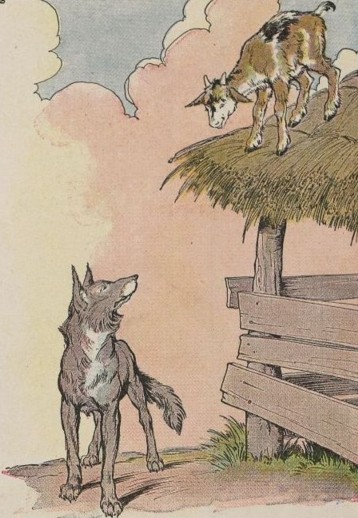PART A_1
Let’s learn vocabulary. Listen and repeat the words and the sentences with your tutor.
PART A_2
| 1. browse | /brouz/ |
| -to eat, nibble at, or feed on | |
| The boy took a picture of a giraffe as it was browsing on a tall tree. | |
| 2. abuse | /uh-BYOOZ/ |
| -to use wrongly or improperly; misuse: | |
| He got fired because he abused his authority as a supervisor. | |
| 3. content | /KON-tent/ |
| -something that is contained: | |
| He poured the contents of the cereal box into his bowl. | |
| 4. least | /leest/ |
| -smallest in size, amount, degree, etc.; slightest: | |
| Sweet beans was his least favorite ingredient. | |
| 5. grudge | /gruhj/ |
| -a feeling of ill will or resentment: | |
| They never knew that she held a grudge against them until she left the team. |
PART B_1
Let’s read the story. Please read it aloud, and I will check your pronunciation and intonation.
PART B_2
THE KID AND THE WOLF

A frisky young Kid had been left by the herdsman on the thatched roof of a sheep shelter to keep him out of harm’s way. The Kid was browsing near the edge of the roof, when he spied a Wolf and began to jeer at him, making faces and abusing him to his heart’s content.
“I hear you”, said the Wolf, “and I haven’t the least grudge against you for what you say or do. When you are up there it is the roof that’s talking, not you.”
Do not say anything at any time that you would not say at all times.
PART C_1
Let’s answer comprehension questions. Please answer them based on the story.
PART C_2
| 1. | Where did the herdsman leave the kid? |
| 2. | What did the kid do to the wolf? |
| 3. | How did the wolf react? |
PART D_1
Let’s discuss the story. Please answer the questions below and express your opinions.
PART D_2
| 1. | What do you think was the reason why the kid made fun of the wolf? |
| 2. | In your opinion, would the kid do the same thing if the kid was on the ground? |
| 3. | What is your comment on the wolf’s reaction to the kid? |
| 4. | The fable’s lesson is “Do not say anything at any time that you would not say at all times.” Do you agree with this? Why or why not? |
| 5. | In your culture, is it important to communicate politely? Why or why not? |
REVIEW AND FEEDBACK
Now, let us review the things that you learned in this lesson.
ではこのレッスンで学んだことを振り返りましょう。
(Please give a short feedback on how your student did on your class.)
| Grammar 文法 |
Pronunciation 発音 | Vocabulary 単語 |
Comprehension 理解 |
|
|---|---|---|---|---|
 GOOD GOOD |
文法の誤りはほとんどなく、完全な文章で話すことができる | ほとんどの単語をはっきりと正しく発音することができる | 習った表現を適切に使うことができる | 文章を理解し、質問に正しく答えることができる |
 FAIR |
文法の誤りはあるが、完全な文章で話すことができる | 発音の練習が必要な言葉がいくつかある | たまにミスはあるが、習った表現を適切に使うことができる | 文章を完全に理解するのは難しく、質問に正しく答えられないときもある |
 POOR |
文章で話すのは難しく、単語だけで話すことができる | 発音の練習が必要である | 習った単語と表現を少しだけ使うことができる | 文章を理解するのは難しく、質問に答えるのは難しい |
Parts of this lesson material are based on:
An eBook from The Project Gutenberg.
This eBook is for the use of anyone anywhere at no cost and with almost no restrictions whatsoever. You may copy it, give it away or re-use it under the terms of the Project Gutenberg License included with this eBook or online at www.gutenberg.org
An eBook from The Project Gutenberg.
This eBook is for the use of anyone anywhere at no cost and with almost no restrictions whatsoever. You may copy it, give it away or re-use it under the terms of the Project Gutenberg License included with this eBook or online at www.gutenberg.org